Analyzing Facebook's Business Ethics and Social Responsibility
VerifiedAdded on 2021/06/17
|11
|2483
|25
Essay
AI Summary
This essay explores the business ethics issues faced by Facebook, particularly concerning data privacy and corporate social responsibility, highlighted by the Cambridge Analytica scandal. The analysis focuses on the erosion of public trust and the company's response, including the implementation of new privacy principles and compliance measures. The essay also discusses the ethical decision-making process, emphasizing the importance of adhering to data protection laws and considering the moral philosophy of deontology. It concludes that companies must prioritize ethical conduct and compliance with relevant laws to maintain public trust and achieve business success. Desklib provides access to similar solved assignments and resources for students.
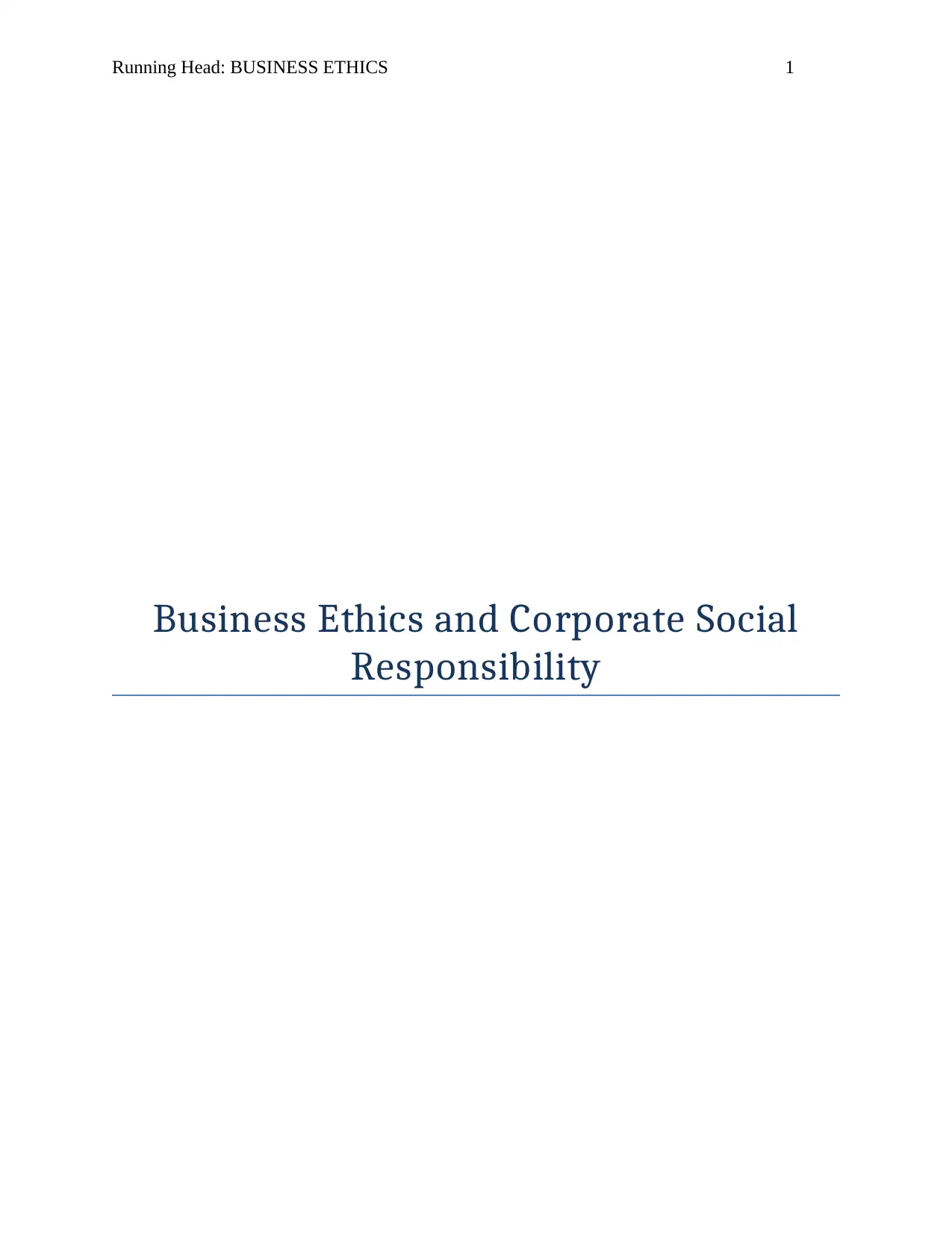
Running Head: BUSINESS ETHICS 1
Business Ethics and Corporate Social
Responsibility
Business Ethics and Corporate Social
Responsibility
Paraphrase This Document
Need a fresh take? Get an instant paraphrase of this document with our AI Paraphraser
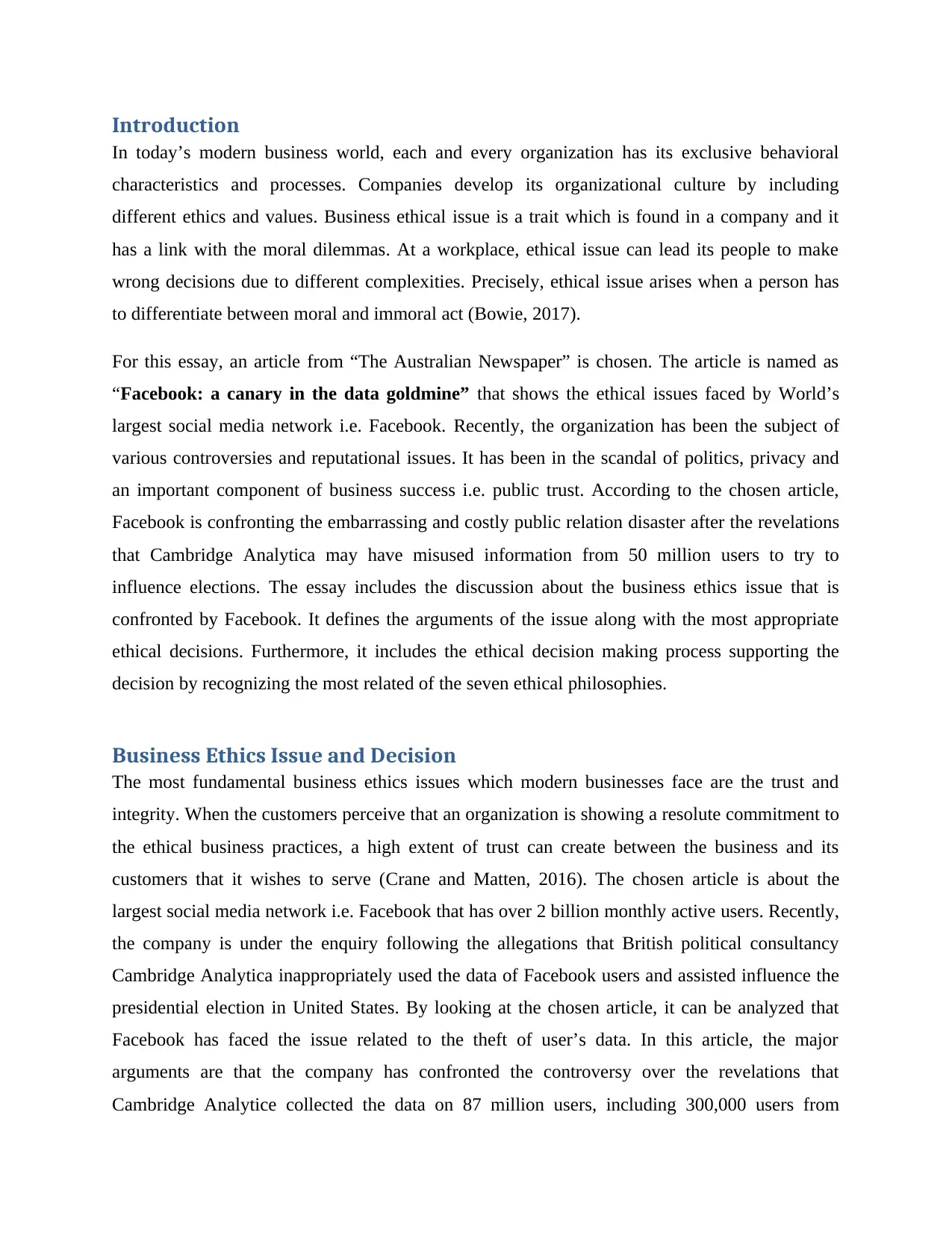
Introduction
In today’s modern business world, each and every organization has its exclusive behavioral
characteristics and processes. Companies develop its organizational culture by including
different ethics and values. Business ethical issue is a trait which is found in a company and it
has a link with the moral dilemmas. At a workplace, ethical issue can lead its people to make
wrong decisions due to different complexities. Precisely, ethical issue arises when a person has
to differentiate between moral and immoral act (Bowie, 2017).
For this essay, an article from “The Australian Newspaper” is chosen. The article is named as
“Facebook: a canary in the data goldmine” that shows the ethical issues faced by World’s
largest social media network i.e. Facebook. Recently, the organization has been the subject of
various controversies and reputational issues. It has been in the scandal of politics, privacy and
an important component of business success i.e. public trust. According to the chosen article,
Facebook is confronting the embarrassing and costly public relation disaster after the revelations
that Cambridge Analytica may have misused information from 50 million users to try to
influence elections. The essay includes the discussion about the business ethics issue that is
confronted by Facebook. It defines the arguments of the issue along with the most appropriate
ethical decisions. Furthermore, it includes the ethical decision making process supporting the
decision by recognizing the most related of the seven ethical philosophies.
Business Ethics Issue and Decision
The most fundamental business ethics issues which modern businesses face are the trust and
integrity. When the customers perceive that an organization is showing a resolute commitment to
the ethical business practices, a high extent of trust can create between the business and its
customers that it wishes to serve (Crane and Matten, 2016). The chosen article is about the
largest social media network i.e. Facebook that has over 2 billion monthly active users. Recently,
the company is under the enquiry following the allegations that British political consultancy
Cambridge Analytica inappropriately used the data of Facebook users and assisted influence the
presidential election in United States. By looking at the chosen article, it can be analyzed that
Facebook has faced the issue related to the theft of user’s data. In this article, the major
arguments are that the company has confronted the controversy over the revelations that
Cambridge Analytice collected the data on 87 million users, including 300,000 users from
In today’s modern business world, each and every organization has its exclusive behavioral
characteristics and processes. Companies develop its organizational culture by including
different ethics and values. Business ethical issue is a trait which is found in a company and it
has a link with the moral dilemmas. At a workplace, ethical issue can lead its people to make
wrong decisions due to different complexities. Precisely, ethical issue arises when a person has
to differentiate between moral and immoral act (Bowie, 2017).
For this essay, an article from “The Australian Newspaper” is chosen. The article is named as
“Facebook: a canary in the data goldmine” that shows the ethical issues faced by World’s
largest social media network i.e. Facebook. Recently, the organization has been the subject of
various controversies and reputational issues. It has been in the scandal of politics, privacy and
an important component of business success i.e. public trust. According to the chosen article,
Facebook is confronting the embarrassing and costly public relation disaster after the revelations
that Cambridge Analytica may have misused information from 50 million users to try to
influence elections. The essay includes the discussion about the business ethics issue that is
confronted by Facebook. It defines the arguments of the issue along with the most appropriate
ethical decisions. Furthermore, it includes the ethical decision making process supporting the
decision by recognizing the most related of the seven ethical philosophies.
Business Ethics Issue and Decision
The most fundamental business ethics issues which modern businesses face are the trust and
integrity. When the customers perceive that an organization is showing a resolute commitment to
the ethical business practices, a high extent of trust can create between the business and its
customers that it wishes to serve (Crane and Matten, 2016). The chosen article is about the
largest social media network i.e. Facebook that has over 2 billion monthly active users. Recently,
the company is under the enquiry following the allegations that British political consultancy
Cambridge Analytica inappropriately used the data of Facebook users and assisted influence the
presidential election in United States. By looking at the chosen article, it can be analyzed that
Facebook has faced the issue related to the theft of user’s data. In this article, the major
arguments are that the company has confronted the controversy over the revelations that
Cambridge Analytice collected the data on 87 million users, including 300,000 users from
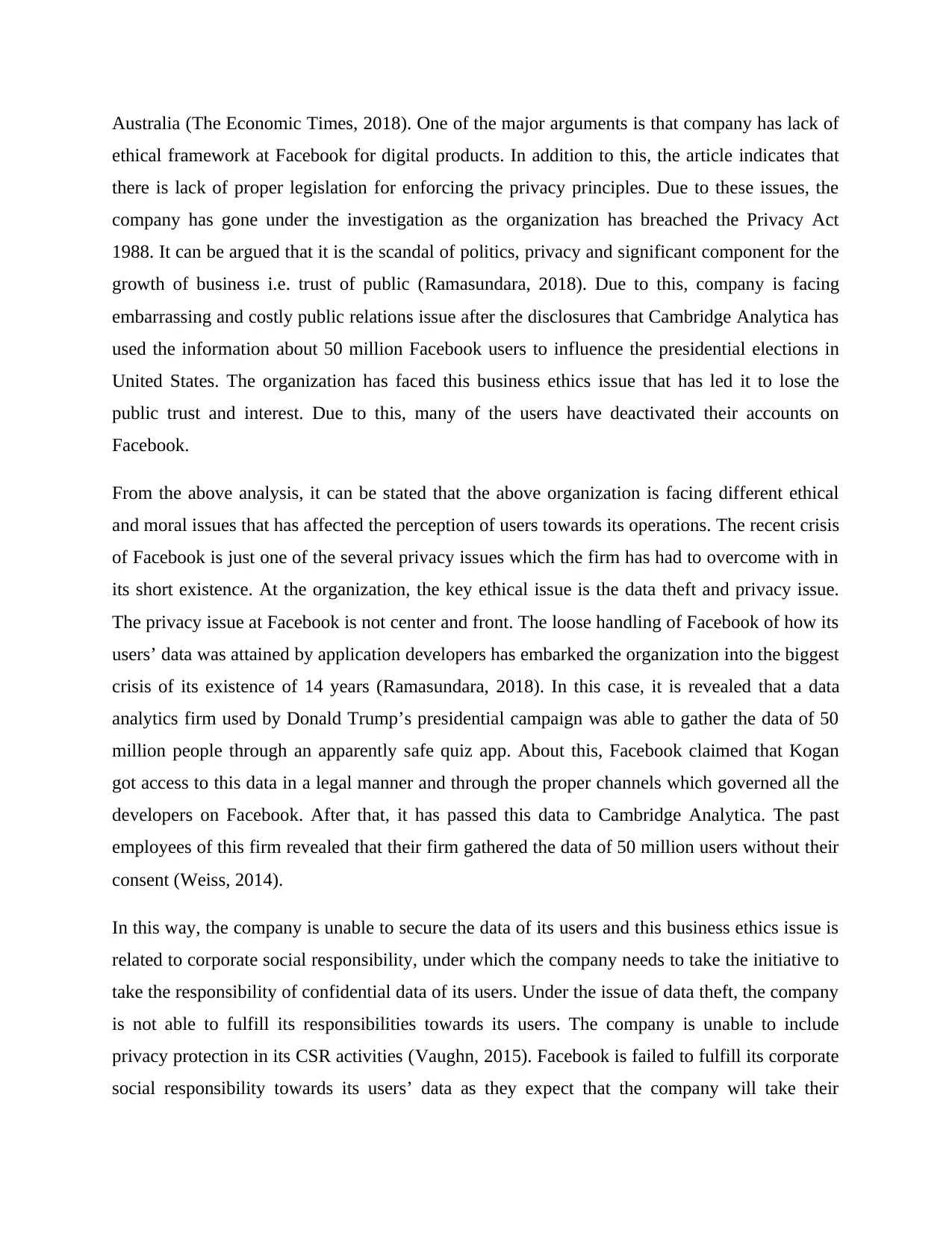
Australia (The Economic Times, 2018). One of the major arguments is that company has lack of
ethical framework at Facebook for digital products. In addition to this, the article indicates that
there is lack of proper legislation for enforcing the privacy principles. Due to these issues, the
company has gone under the investigation as the organization has breached the Privacy Act
1988. It can be argued that it is the scandal of politics, privacy and significant component for the
growth of business i.e. trust of public (Ramasundara, 2018). Due to this, company is facing
embarrassing and costly public relations issue after the disclosures that Cambridge Analytica has
used the information about 50 million Facebook users to influence the presidential elections in
United States. The organization has faced this business ethics issue that has led it to lose the
public trust and interest. Due to this, many of the users have deactivated their accounts on
Facebook.
From the above analysis, it can be stated that the above organization is facing different ethical
and moral issues that has affected the perception of users towards its operations. The recent crisis
of Facebook is just one of the several privacy issues which the firm has had to overcome with in
its short existence. At the organization, the key ethical issue is the data theft and privacy issue.
The privacy issue at Facebook is not center and front. The loose handling of Facebook of how its
users’ data was attained by application developers has embarked the organization into the biggest
crisis of its existence of 14 years (Ramasundara, 2018). In this case, it is revealed that a data
analytics firm used by Donald Trump’s presidential campaign was able to gather the data of 50
million people through an apparently safe quiz app. About this, Facebook claimed that Kogan
got access to this data in a legal manner and through the proper channels which governed all the
developers on Facebook. After that, it has passed this data to Cambridge Analytica. The past
employees of this firm revealed that their firm gathered the data of 50 million users without their
consent (Weiss, 2014).
In this way, the company is unable to secure the data of its users and this business ethics issue is
related to corporate social responsibility, under which the company needs to take the initiative to
take the responsibility of confidential data of its users. Under the issue of data theft, the company
is not able to fulfill its responsibilities towards its users. The company is unable to include
privacy protection in its CSR activities (Vaughn, 2015). Facebook is failed to fulfill its corporate
social responsibility towards its users’ data as they expect that the company will take their
ethical framework at Facebook for digital products. In addition to this, the article indicates that
there is lack of proper legislation for enforcing the privacy principles. Due to these issues, the
company has gone under the investigation as the organization has breached the Privacy Act
1988. It can be argued that it is the scandal of politics, privacy and significant component for the
growth of business i.e. trust of public (Ramasundara, 2018). Due to this, company is facing
embarrassing and costly public relations issue after the disclosures that Cambridge Analytica has
used the information about 50 million Facebook users to influence the presidential elections in
United States. The organization has faced this business ethics issue that has led it to lose the
public trust and interest. Due to this, many of the users have deactivated their accounts on
Facebook.
From the above analysis, it can be stated that the above organization is facing different ethical
and moral issues that has affected the perception of users towards its operations. The recent crisis
of Facebook is just one of the several privacy issues which the firm has had to overcome with in
its short existence. At the organization, the key ethical issue is the data theft and privacy issue.
The privacy issue at Facebook is not center and front. The loose handling of Facebook of how its
users’ data was attained by application developers has embarked the organization into the biggest
crisis of its existence of 14 years (Ramasundara, 2018). In this case, it is revealed that a data
analytics firm used by Donald Trump’s presidential campaign was able to gather the data of 50
million people through an apparently safe quiz app. About this, Facebook claimed that Kogan
got access to this data in a legal manner and through the proper channels which governed all the
developers on Facebook. After that, it has passed this data to Cambridge Analytica. The past
employees of this firm revealed that their firm gathered the data of 50 million users without their
consent (Weiss, 2014).
In this way, the company is unable to secure the data of its users and this business ethics issue is
related to corporate social responsibility, under which the company needs to take the initiative to
take the responsibility of confidential data of its users. Under the issue of data theft, the company
is not able to fulfill its responsibilities towards its users. The company is unable to include
privacy protection in its CSR activities (Vaughn, 2015). Facebook is failed to fulfill its corporate
social responsibility towards its users’ data as they expect that the company will take their
⊘ This is a preview!⊘
Do you want full access?
Subscribe today to unlock all pages.

Trusted by 1+ million students worldwide
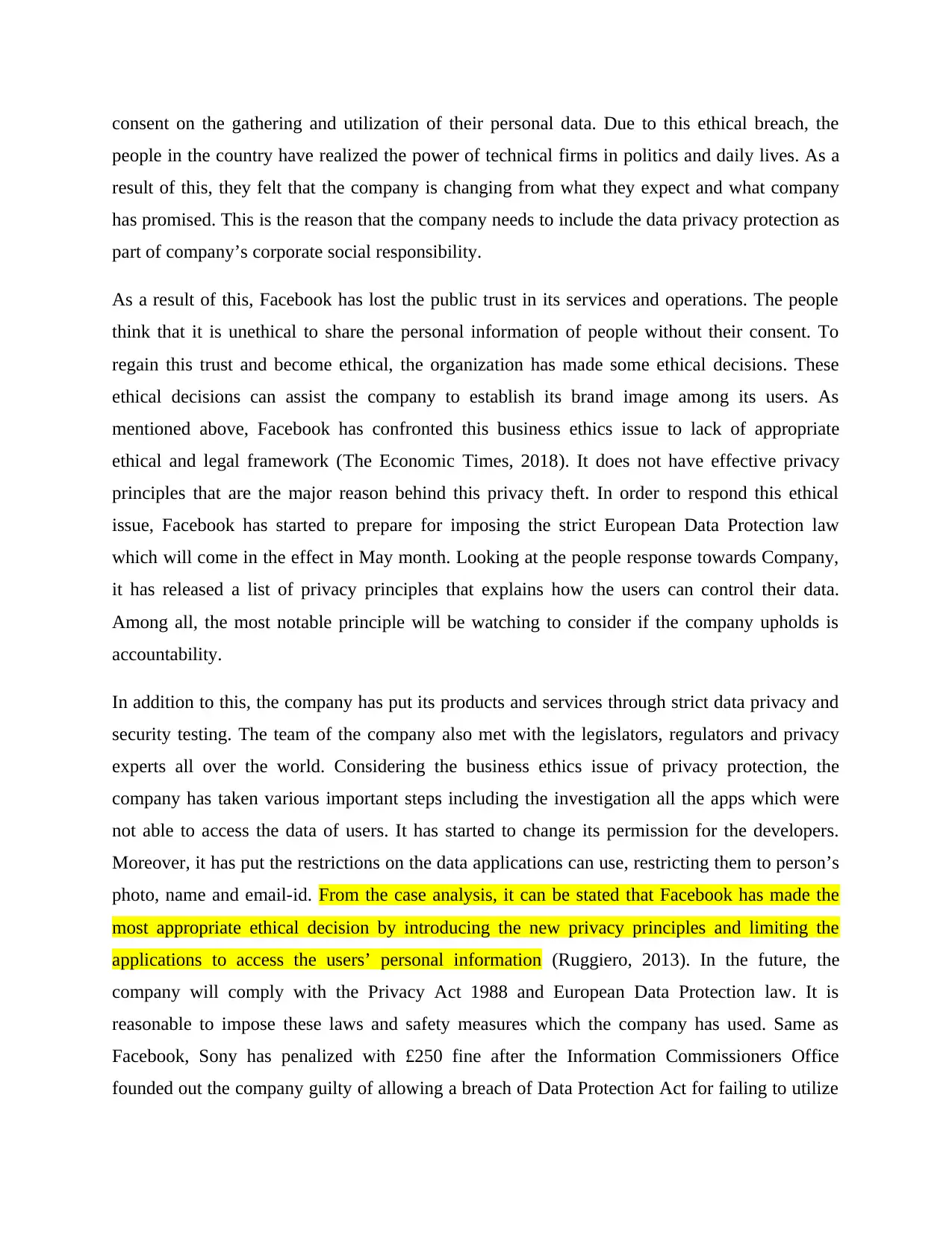
consent on the gathering and utilization of their personal data. Due to this ethical breach, the
people in the country have realized the power of technical firms in politics and daily lives. As a
result of this, they felt that the company is changing from what they expect and what company
has promised. This is the reason that the company needs to include the data privacy protection as
part of company’s corporate social responsibility.
As a result of this, Facebook has lost the public trust in its services and operations. The people
think that it is unethical to share the personal information of people without their consent. To
regain this trust and become ethical, the organization has made some ethical decisions. These
ethical decisions can assist the company to establish its brand image among its users. As
mentioned above, Facebook has confronted this business ethics issue to lack of appropriate
ethical and legal framework (The Economic Times, 2018). It does not have effective privacy
principles that are the major reason behind this privacy theft. In order to respond this ethical
issue, Facebook has started to prepare for imposing the strict European Data Protection law
which will come in the effect in May month. Looking at the people response towards Company,
it has released a list of privacy principles that explains how the users can control their data.
Among all, the most notable principle will be watching to consider if the company upholds is
accountability.
In addition to this, the company has put its products and services through strict data privacy and
security testing. The team of the company also met with the legislators, regulators and privacy
experts all over the world. Considering the business ethics issue of privacy protection, the
company has taken various important steps including the investigation all the apps which were
not able to access the data of users. It has started to change its permission for the developers.
Moreover, it has put the restrictions on the data applications can use, restricting them to person’s
photo, name and email-id. From the case analysis, it can be stated that Facebook has made the
most appropriate ethical decision by introducing the new privacy principles and limiting the
applications to access the users’ personal information (Ruggiero, 2013). In the future, the
company will comply with the Privacy Act 1988 and European Data Protection law. It is
reasonable to impose these laws and safety measures which the company has used. Same as
Facebook, Sony has penalized with £250 fine after the Information Commissioners Office
founded out the company guilty of allowing a breach of Data Protection Act for failing to utilize
people in the country have realized the power of technical firms in politics and daily lives. As a
result of this, they felt that the company is changing from what they expect and what company
has promised. This is the reason that the company needs to include the data privacy protection as
part of company’s corporate social responsibility.
As a result of this, Facebook has lost the public trust in its services and operations. The people
think that it is unethical to share the personal information of people without their consent. To
regain this trust and become ethical, the organization has made some ethical decisions. These
ethical decisions can assist the company to establish its brand image among its users. As
mentioned above, Facebook has confronted this business ethics issue to lack of appropriate
ethical and legal framework (The Economic Times, 2018). It does not have effective privacy
principles that are the major reason behind this privacy theft. In order to respond this ethical
issue, Facebook has started to prepare for imposing the strict European Data Protection law
which will come in the effect in May month. Looking at the people response towards Company,
it has released a list of privacy principles that explains how the users can control their data.
Among all, the most notable principle will be watching to consider if the company upholds is
accountability.
In addition to this, the company has put its products and services through strict data privacy and
security testing. The team of the company also met with the legislators, regulators and privacy
experts all over the world. Considering the business ethics issue of privacy protection, the
company has taken various important steps including the investigation all the apps which were
not able to access the data of users. It has started to change its permission for the developers.
Moreover, it has put the restrictions on the data applications can use, restricting them to person’s
photo, name and email-id. From the case analysis, it can be stated that Facebook has made the
most appropriate ethical decision by introducing the new privacy principles and limiting the
applications to access the users’ personal information (Ruggiero, 2013). In the future, the
company will comply with the Privacy Act 1988 and European Data Protection law. It is
reasonable to impose these laws and safety measures which the company has used. Same as
Facebook, Sony has penalized with £250 fine after the Information Commissioners Office
founded out the company guilty of allowing a breach of Data Protection Act for failing to utilize
Paraphrase This Document
Need a fresh take? Get an instant paraphrase of this document with our AI Paraphraser
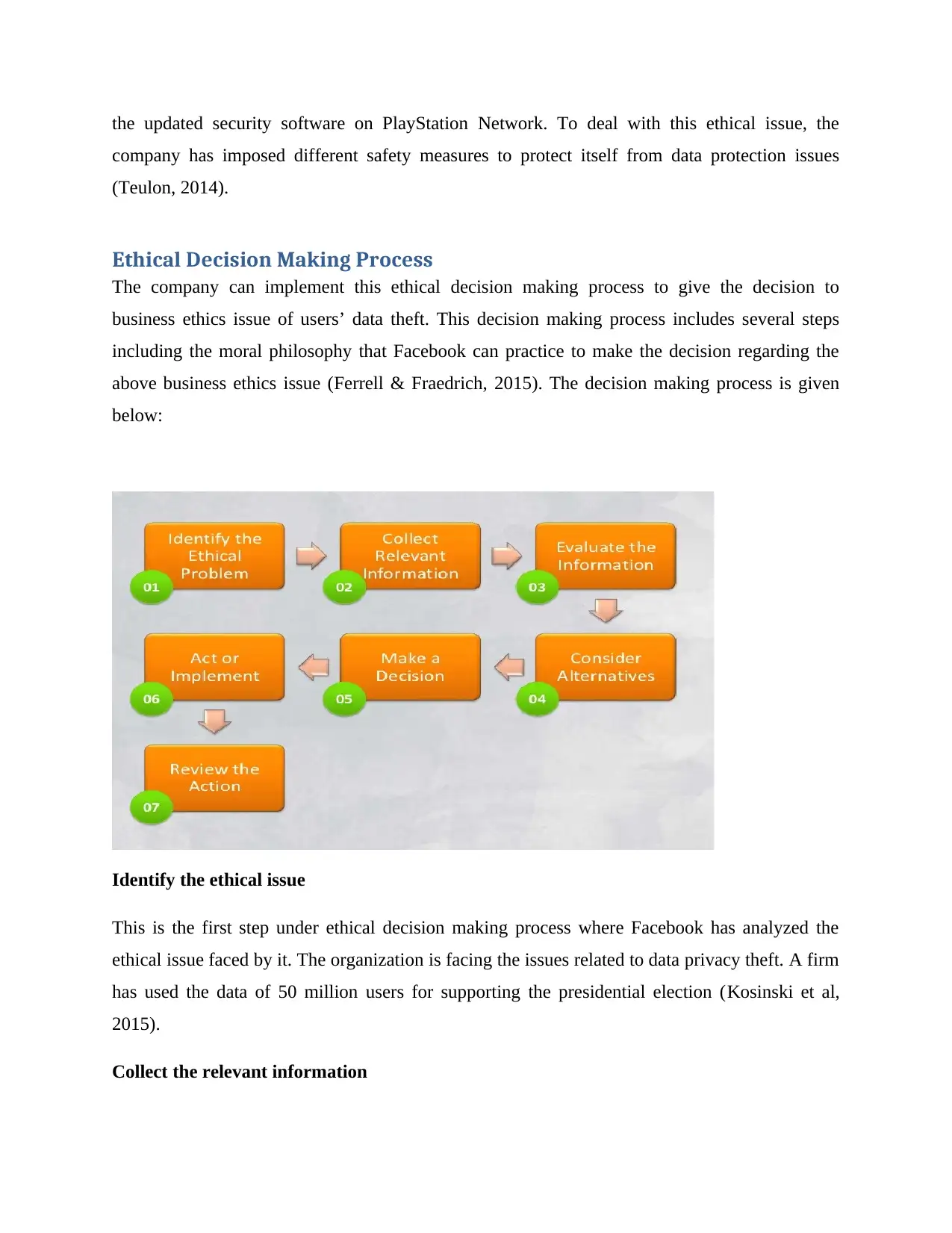
the updated security software on PlayStation Network. To deal with this ethical issue, the
company has imposed different safety measures to protect itself from data protection issues
(Teulon, 2014).
Ethical Decision Making Process
The company can implement this ethical decision making process to give the decision to
business ethics issue of users’ data theft. This decision making process includes several steps
including the moral philosophy that Facebook can practice to make the decision regarding the
above business ethics issue (Ferrell & Fraedrich, 2015). The decision making process is given
below:
Identify the ethical issue
This is the first step under ethical decision making process where Facebook has analyzed the
ethical issue faced by it. The organization is facing the issues related to data privacy theft. A firm
has used the data of 50 million users for supporting the presidential election (Kosinski et al,
2015).
Collect the relevant information
company has imposed different safety measures to protect itself from data protection issues
(Teulon, 2014).
Ethical Decision Making Process
The company can implement this ethical decision making process to give the decision to
business ethics issue of users’ data theft. This decision making process includes several steps
including the moral philosophy that Facebook can practice to make the decision regarding the
above business ethics issue (Ferrell & Fraedrich, 2015). The decision making process is given
below:
Identify the ethical issue
This is the first step under ethical decision making process where Facebook has analyzed the
ethical issue faced by it. The organization is facing the issues related to data privacy theft. A firm
has used the data of 50 million users for supporting the presidential election (Kosinski et al,
2015).
Collect the relevant information
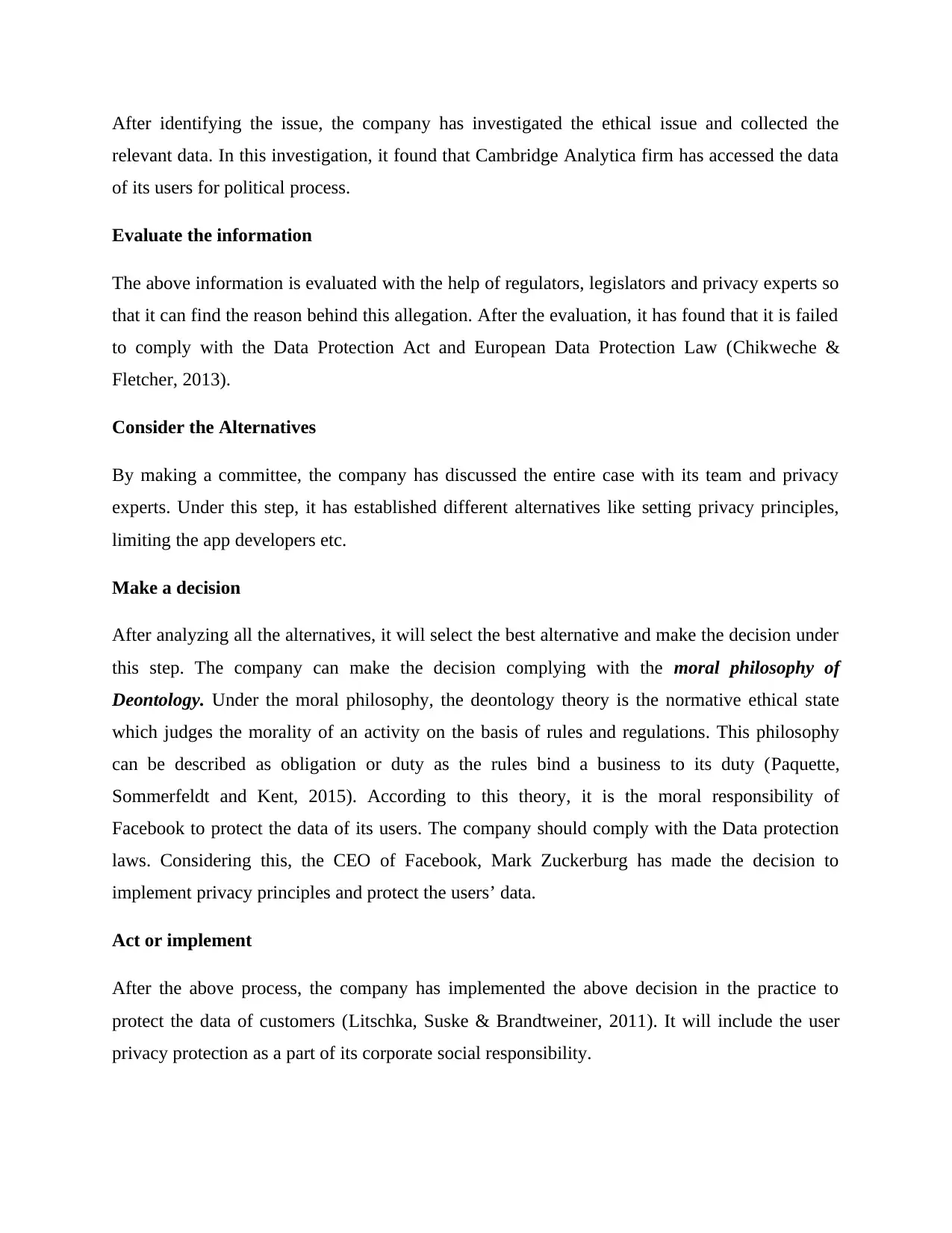
After identifying the issue, the company has investigated the ethical issue and collected the
relevant data. In this investigation, it found that Cambridge Analytica firm has accessed the data
of its users for political process.
Evaluate the information
The above information is evaluated with the help of regulators, legislators and privacy experts so
that it can find the reason behind this allegation. After the evaluation, it has found that it is failed
to comply with the Data Protection Act and European Data Protection Law (Chikweche &
Fletcher, 2013).
Consider the Alternatives
By making a committee, the company has discussed the entire case with its team and privacy
experts. Under this step, it has established different alternatives like setting privacy principles,
limiting the app developers etc.
Make a decision
After analyzing all the alternatives, it will select the best alternative and make the decision under
this step. The company can make the decision complying with the moral philosophy of
Deontology. Under the moral philosophy, the deontology theory is the normative ethical state
which judges the morality of an activity on the basis of rules and regulations. This philosophy
can be described as obligation or duty as the rules bind a business to its duty (Paquette,
Sommerfeldt and Kent, 2015). According to this theory, it is the moral responsibility of
Facebook to protect the data of its users. The company should comply with the Data protection
laws. Considering this, the CEO of Facebook, Mark Zuckerburg has made the decision to
implement privacy principles and protect the users’ data.
Act or implement
After the above process, the company has implemented the above decision in the practice to
protect the data of customers (Litschka, Suske & Brandtweiner, 2011). It will include the user
privacy protection as a part of its corporate social responsibility.
relevant data. In this investigation, it found that Cambridge Analytica firm has accessed the data
of its users for political process.
Evaluate the information
The above information is evaluated with the help of regulators, legislators and privacy experts so
that it can find the reason behind this allegation. After the evaluation, it has found that it is failed
to comply with the Data Protection Act and European Data Protection Law (Chikweche &
Fletcher, 2013).
Consider the Alternatives
By making a committee, the company has discussed the entire case with its team and privacy
experts. Under this step, it has established different alternatives like setting privacy principles,
limiting the app developers etc.
Make a decision
After analyzing all the alternatives, it will select the best alternative and make the decision under
this step. The company can make the decision complying with the moral philosophy of
Deontology. Under the moral philosophy, the deontology theory is the normative ethical state
which judges the morality of an activity on the basis of rules and regulations. This philosophy
can be described as obligation or duty as the rules bind a business to its duty (Paquette,
Sommerfeldt and Kent, 2015). According to this theory, it is the moral responsibility of
Facebook to protect the data of its users. The company should comply with the Data protection
laws. Considering this, the CEO of Facebook, Mark Zuckerburg has made the decision to
implement privacy principles and protect the users’ data.
Act or implement
After the above process, the company has implemented the above decision in the practice to
protect the data of customers (Litschka, Suske & Brandtweiner, 2011). It will include the user
privacy protection as a part of its corporate social responsibility.
⊘ This is a preview!⊘
Do you want full access?
Subscribe today to unlock all pages.

Trusted by 1+ million students worldwide
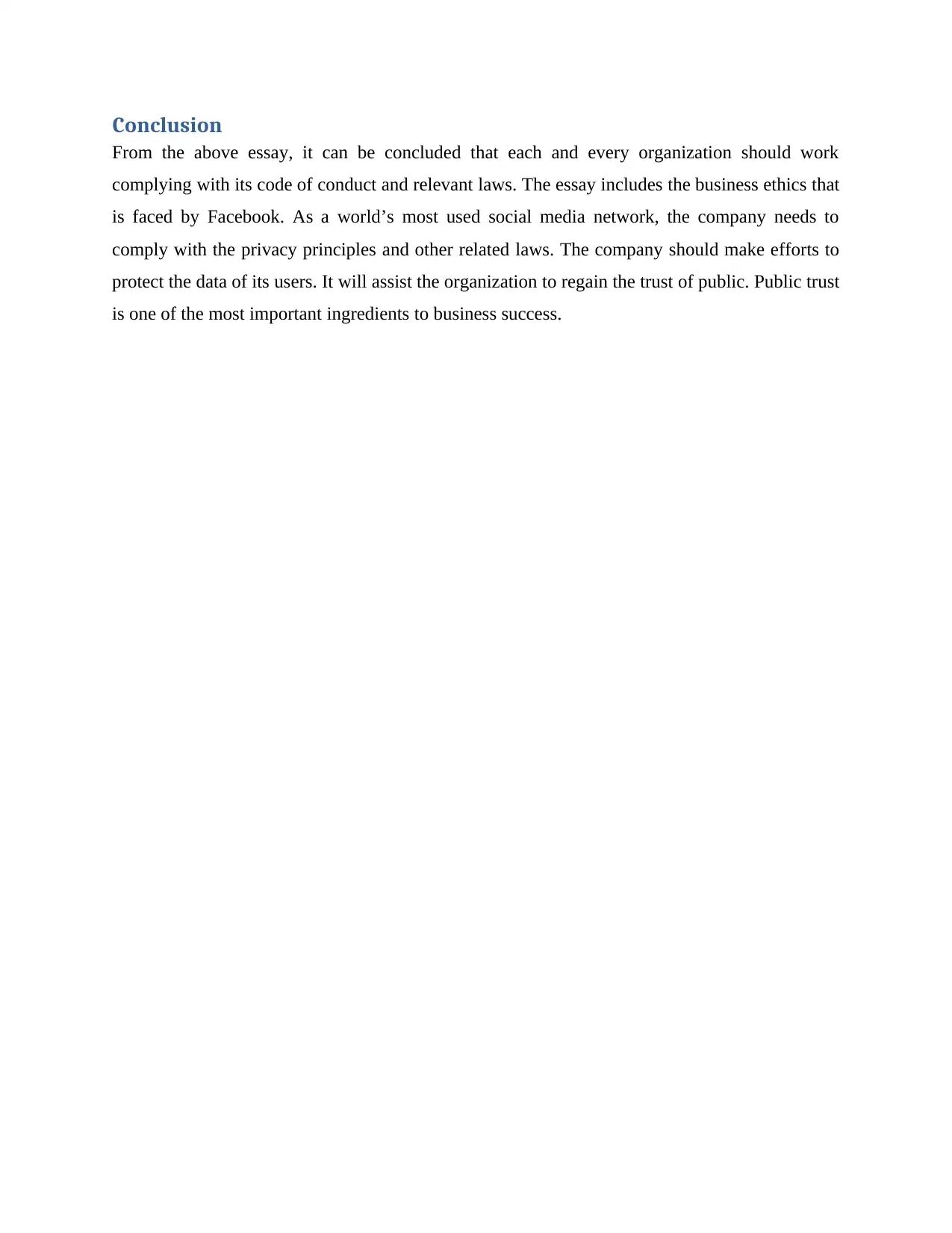
Conclusion
From the above essay, it can be concluded that each and every organization should work
complying with its code of conduct and relevant laws. The essay includes the business ethics that
is faced by Facebook. As a world’s most used social media network, the company needs to
comply with the privacy principles and other related laws. The company should make efforts to
protect the data of its users. It will assist the organization to regain the trust of public. Public trust
is one of the most important ingredients to business success.
From the above essay, it can be concluded that each and every organization should work
complying with its code of conduct and relevant laws. The essay includes the business ethics that
is faced by Facebook. As a world’s most used social media network, the company needs to
comply with the privacy principles and other related laws. The company should make efforts to
protect the data of its users. It will assist the organization to regain the trust of public. Public trust
is one of the most important ingredients to business success.
Paraphrase This Document
Need a fresh take? Get an instant paraphrase of this document with our AI Paraphraser
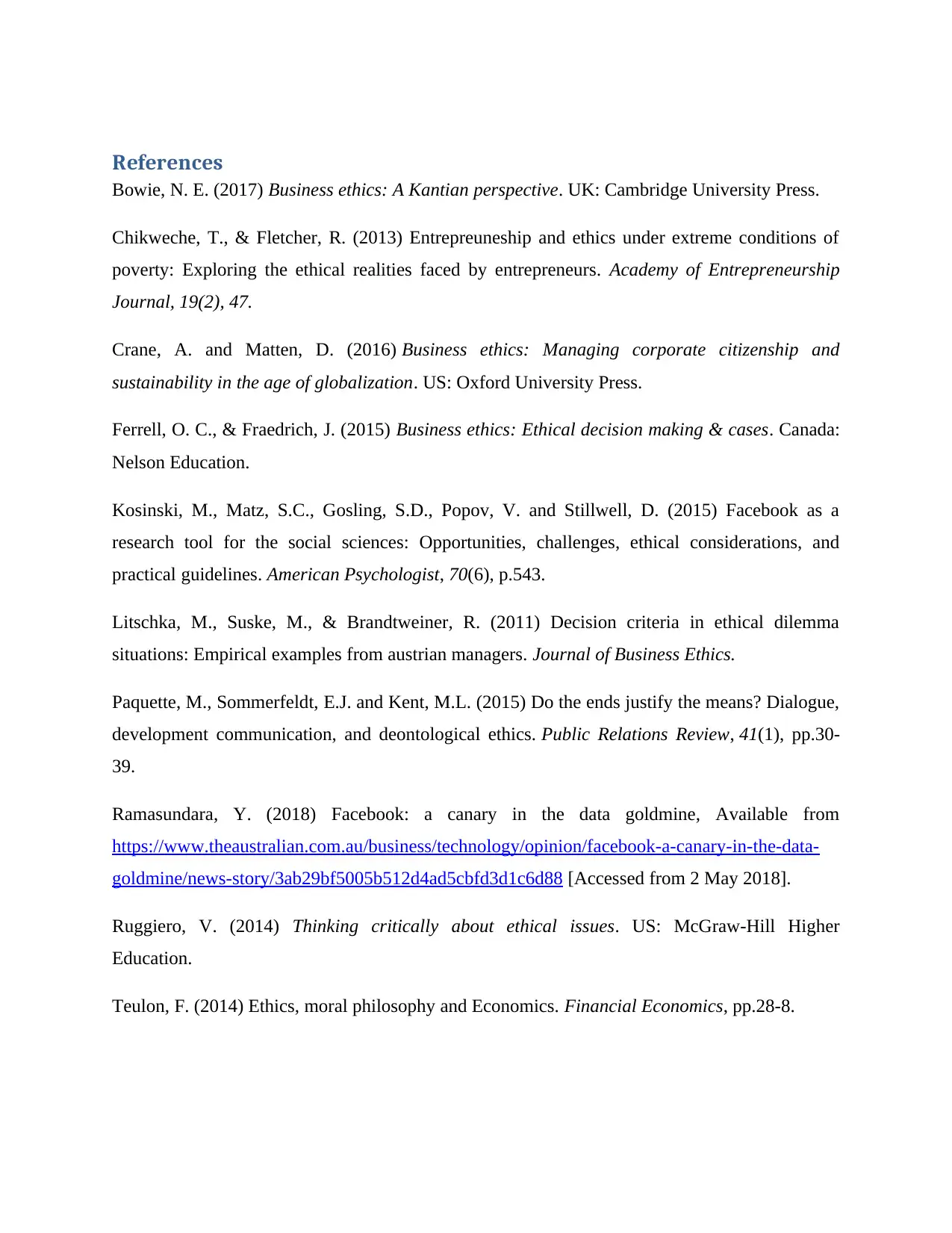
References
Bowie, N. E. (2017) Business ethics: A Kantian perspective. UK: Cambridge University Press.
Chikweche, T., & Fletcher, R. (2013) Entrepreuneship and ethics under extreme conditions of
poverty: Exploring the ethical realities faced by entrepreneurs. Academy of Entrepreneurship
Journal, 19(2), 47.
Crane, A. and Matten, D. (2016) Business ethics: Managing corporate citizenship and
sustainability in the age of globalization. US: Oxford University Press.
Ferrell, O. C., & Fraedrich, J. (2015) Business ethics: Ethical decision making & cases. Canada:
Nelson Education.
Kosinski, M., Matz, S.C., Gosling, S.D., Popov, V. and Stillwell, D. (2015) Facebook as a
research tool for the social sciences: Opportunities, challenges, ethical considerations, and
practical guidelines. American Psychologist, 70(6), p.543.
Litschka, M., Suske, M., & Brandtweiner, R. (2011) Decision criteria in ethical dilemma
situations: Empirical examples from austrian managers. Journal of Business Ethics.
Paquette, M., Sommerfeldt, E.J. and Kent, M.L. (2015) Do the ends justify the means? Dialogue,
development communication, and deontological ethics. Public Relations Review, 41(1), pp.30-
39.
Ramasundara, Y. (2018) Facebook: a canary in the data goldmine, Available from
https://www.theaustralian.com.au/business/technology/opinion/facebook-a-canary-in-the-data-
goldmine/news-story/3ab29bf5005b512d4ad5cbfd3d1c6d88 [Accessed from 2 May 2018].
Ruggiero, V. (2014) Thinking critically about ethical issues. US: McGraw-Hill Higher
Education.
Teulon, F. (2014) Ethics, moral philosophy and Economics. Financial Economics, pp.28-8.
Bowie, N. E. (2017) Business ethics: A Kantian perspective. UK: Cambridge University Press.
Chikweche, T., & Fletcher, R. (2013) Entrepreuneship and ethics under extreme conditions of
poverty: Exploring the ethical realities faced by entrepreneurs. Academy of Entrepreneurship
Journal, 19(2), 47.
Crane, A. and Matten, D. (2016) Business ethics: Managing corporate citizenship and
sustainability in the age of globalization. US: Oxford University Press.
Ferrell, O. C., & Fraedrich, J. (2015) Business ethics: Ethical decision making & cases. Canada:
Nelson Education.
Kosinski, M., Matz, S.C., Gosling, S.D., Popov, V. and Stillwell, D. (2015) Facebook as a
research tool for the social sciences: Opportunities, challenges, ethical considerations, and
practical guidelines. American Psychologist, 70(6), p.543.
Litschka, M., Suske, M., & Brandtweiner, R. (2011) Decision criteria in ethical dilemma
situations: Empirical examples from austrian managers. Journal of Business Ethics.
Paquette, M., Sommerfeldt, E.J. and Kent, M.L. (2015) Do the ends justify the means? Dialogue,
development communication, and deontological ethics. Public Relations Review, 41(1), pp.30-
39.
Ramasundara, Y. (2018) Facebook: a canary in the data goldmine, Available from
https://www.theaustralian.com.au/business/technology/opinion/facebook-a-canary-in-the-data-
goldmine/news-story/3ab29bf5005b512d4ad5cbfd3d1c6d88 [Accessed from 2 May 2018].
Ruggiero, V. (2014) Thinking critically about ethical issues. US: McGraw-Hill Higher
Education.
Teulon, F. (2014) Ethics, moral philosophy and Economics. Financial Economics, pp.28-8.
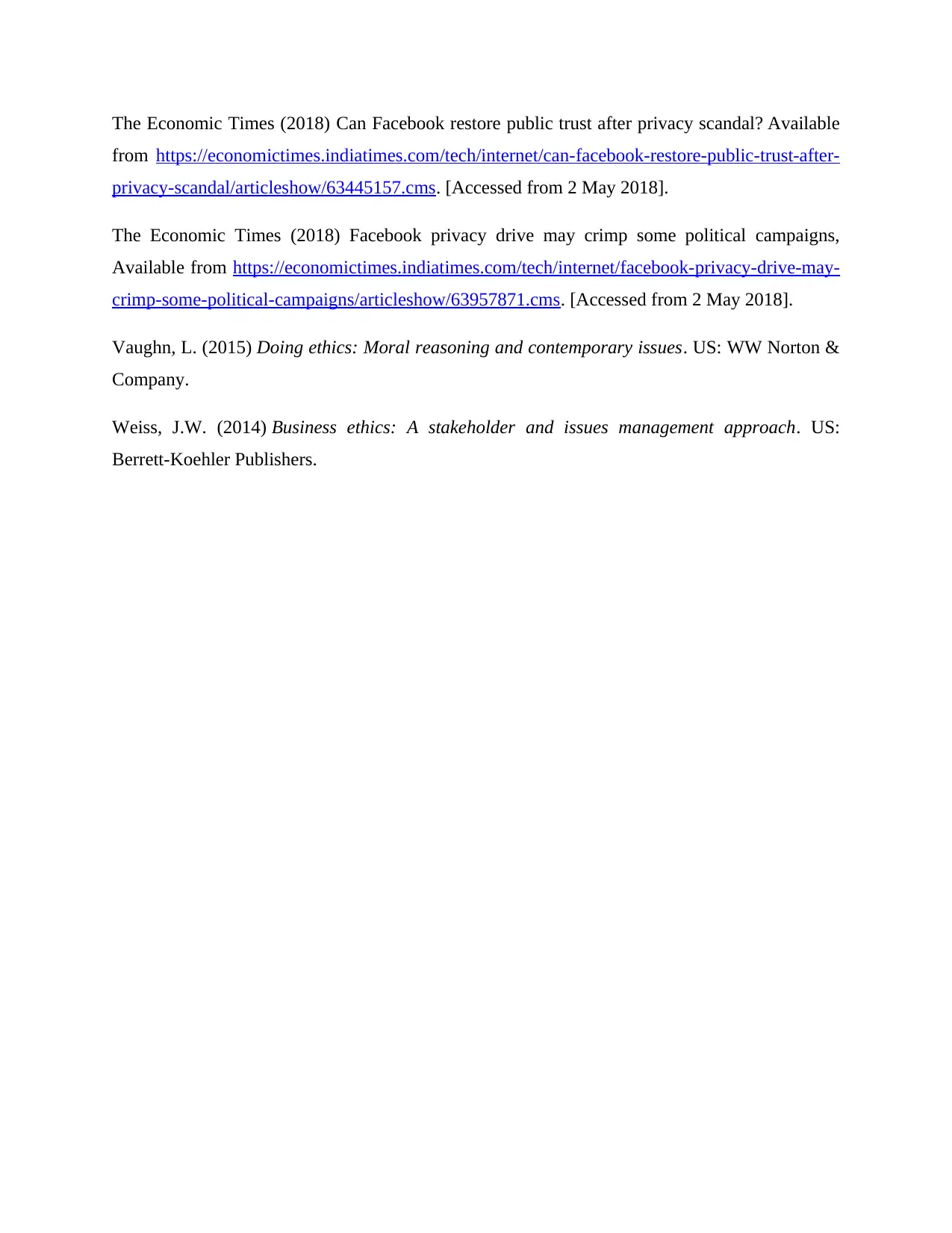
The Economic Times (2018) Can Facebook restore public trust after privacy scandal? Available
from https://economictimes.indiatimes.com/tech/internet/can-facebook-restore-public-trust-after-
privacy-scandal/articleshow/63445157.cms. [Accessed from 2 May 2018].
The Economic Times (2018) Facebook privacy drive may crimp some political campaigns,
Available from https://economictimes.indiatimes.com/tech/internet/facebook-privacy-drive-may-
crimp-some-political-campaigns/articleshow/63957871.cms. [Accessed from 2 May 2018].
Vaughn, L. (2015) Doing ethics: Moral reasoning and contemporary issues. US: WW Norton &
Company.
Weiss, J.W. (2014) Business ethics: A stakeholder and issues management approach. US:
Berrett-Koehler Publishers.
from https://economictimes.indiatimes.com/tech/internet/can-facebook-restore-public-trust-after-
privacy-scandal/articleshow/63445157.cms. [Accessed from 2 May 2018].
The Economic Times (2018) Facebook privacy drive may crimp some political campaigns,
Available from https://economictimes.indiatimes.com/tech/internet/facebook-privacy-drive-may-
crimp-some-political-campaigns/articleshow/63957871.cms. [Accessed from 2 May 2018].
Vaughn, L. (2015) Doing ethics: Moral reasoning and contemporary issues. US: WW Norton &
Company.
Weiss, J.W. (2014) Business ethics: A stakeholder and issues management approach. US:
Berrett-Koehler Publishers.
⊘ This is a preview!⊘
Do you want full access?
Subscribe today to unlock all pages.

Trusted by 1+ million students worldwide
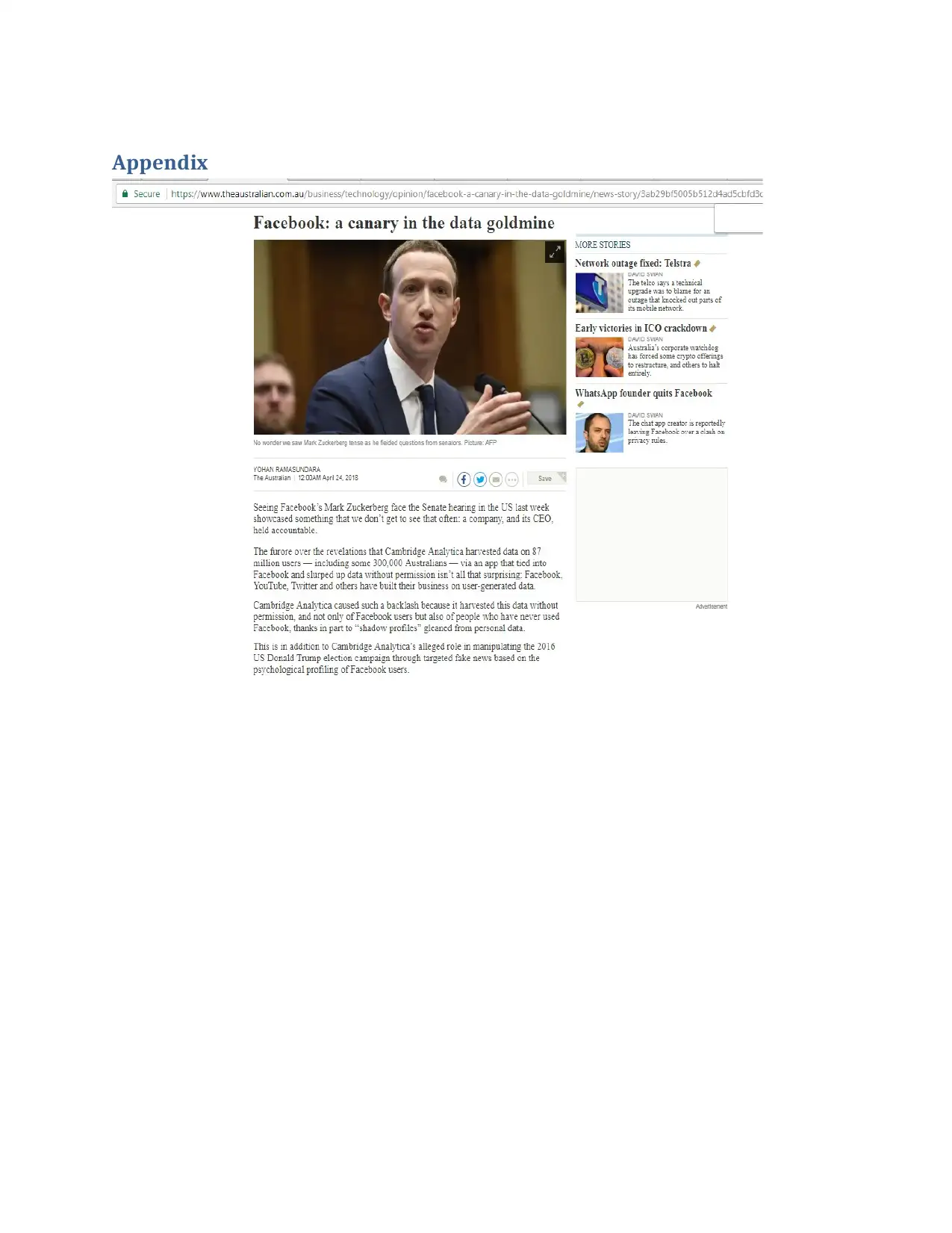
Appendix
Paraphrase This Document
Need a fresh take? Get an instant paraphrase of this document with our AI Paraphraser
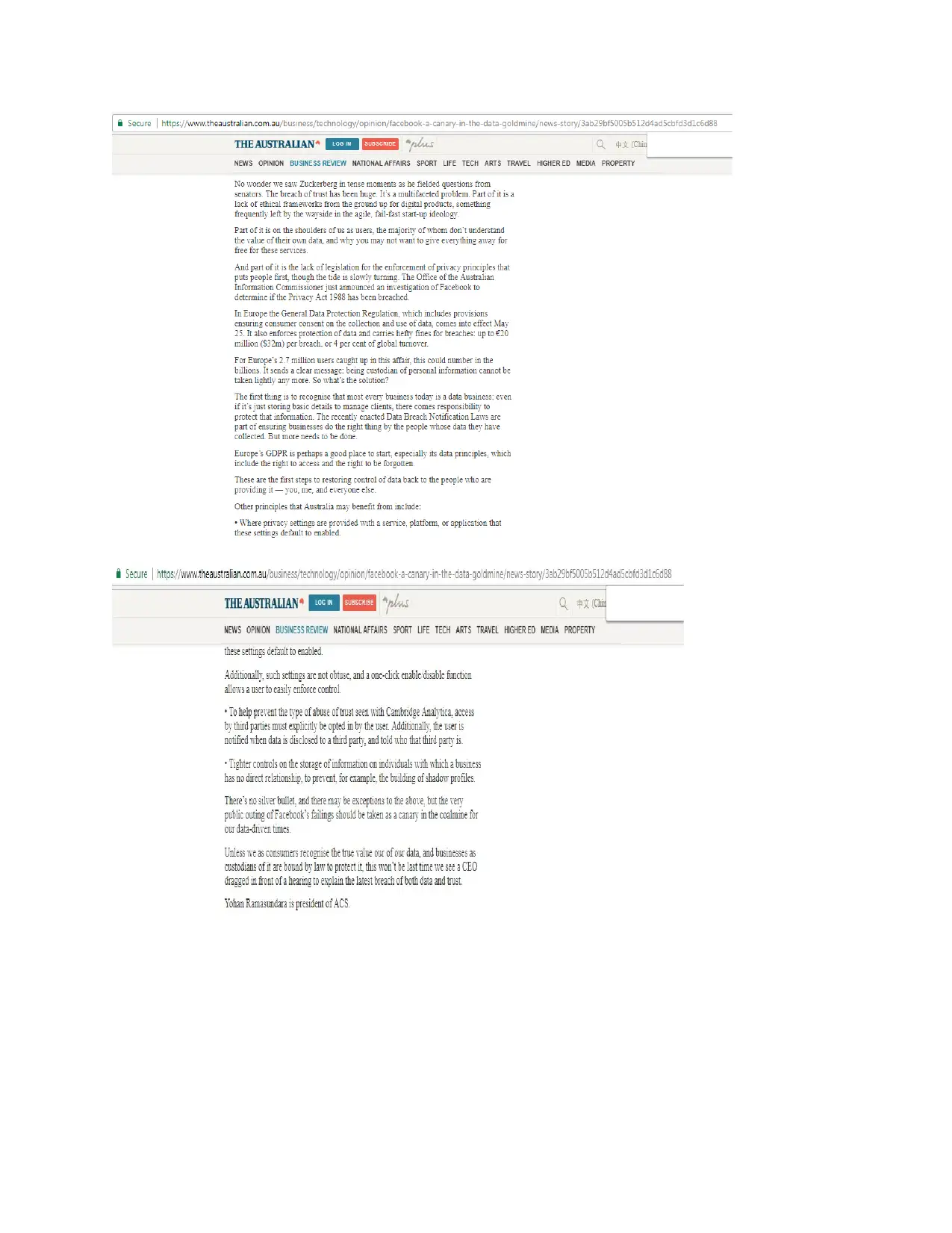
1 out of 11
Related Documents
Your All-in-One AI-Powered Toolkit for Academic Success.
+13062052269
info@desklib.com
Available 24*7 on WhatsApp / Email
![[object Object]](/_next/static/media/star-bottom.7253800d.svg)
Unlock your academic potential
Copyright © 2020–2026 A2Z Services. All Rights Reserved. Developed and managed by ZUCOL.





